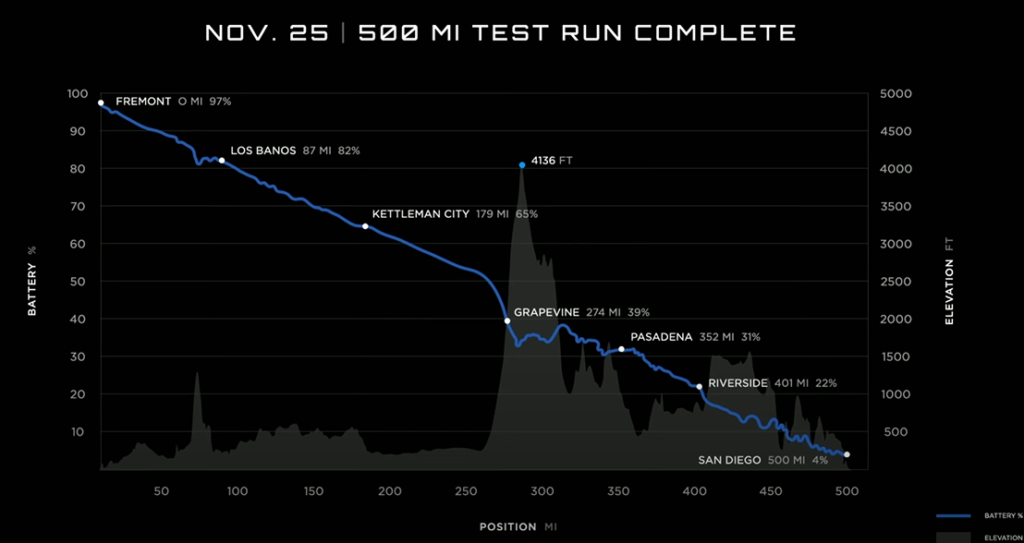After a three-year production delay, Tesla semi production began in October 2022 and just helped a delivery event for PepsiCo on Dec 1st.
This is after battery constraints, parts shortages, and other supply chain issues. But now, the EPA confirmed that the Semi has been assessed by the agency and granted a Certificate of Conformity to enter the stream of commerce, something Tesla had not gained from the agency in previous years after announcing deliveries in 2020 and 2021.
Tesla has a production site near Giga Nevada that can produce around 5 Tesla Semis per week (260 per year), but Elon Musk said Tesla production will take about a year to ramp up to their goal of 50,000 units per year in 2024.
These first semis will be delivered to mega carriers like PepsiCo, Walmart, and others.
But how will the trucking industry and insurance carriers respond?
Tesla Semi is a beast
According to a Torquenews report, a 200-mile trip would cost $169 for a diesel truck (assuming $4.99 per gallon of diesel). A similar trip with a Tesla Semi would cost $28, a saving of 83%.
While electric semis cost 2-3 times comparable diesel counterparts, the cost to operate them and the lower overall cost of ownership means the money spent to purchase the truck can be recouped in just 3 years.
Tesla Semi is a day-cab unit that will focus on local and regional routes, not long-haul, with a range of 500 miles fully loaded with a Gross Vehicle Weight of 82,000 lbs (regulations allow 2,000 pounds extra for electric trucks).
It looks like, based on the graph below, the Tesla Semi:
- Lost 17% range in 92 miles with low elevation (Los Banos to Kettleman)
- Lost 20% range in about 92 miles with high elevation (from beginning of uphill before Grapevine to Pasadena)

The Tesla Semi durability was tested in every type of weather and environment to make sure the reliability is extremely high and can continuously run no matter what comes at it. This includes hot, cold, snow, rain, bumpy dirt roads, and routes over Donner Pass.
New charging technology allows the truck to gain 70 percent state of charge in just 30 minutes. On top of this, Tesla is working with Semi customers to utilize solar power, megapack storage, and charging stations.
This is compared to Daimler’s eCascadia that has 230-mile range and can charge 80% in about 90 minutes.
It is estimated that Tesla Semi would save up to $200,000 over 3 years in fuel costs alone while remote diagnostics, over-the-air software updates and fewer moving parts to maintain will save even more on maintenance and service costs.
PepisCo used its first Tesla Semi to deliver snacks to the event and said it would use these electric trucks to haul cargo between its two plants in California (the Frito-Lay plant in Modesto and the beverage factory in Sacramento).
Why electric semis?
While 1% vehicles in the United States are Semis, they make up 18-20% of vehicle emissions and over 30% in particulate matter emissions.
Electric vehicles have zero tailpipe emissions whereas, on average, one 15-year-old diesel garbage truck traveling approximately 14,000 miles annually will have emitted more than 1.1 tons of NOx over its lifetime.
In Pennsylvania, “fossil fuel vehicles generate 50.2% of the nitrogen oxides in the air, as well as carbon monoxide, fine particulate matter, and hydrocarbons,” said Ramez Ziadeh, acting secretary of PA’s Department of Environmental Protection.
California Air Resources Board (CARB) knows this and has strict goals to get to zero emissions with their Zero-Emission Vehicle (ZEV) program where they push battery-electric vehicles, hydrogen fuel cell vehicles and plug-in hybrid electric vehicles that have ultra-low smog-forming and GHG pollutants, even over the life of a vehicle.
For the economy, transportation costs can represent up to 10% of the price of a consumer good. Fuel efficiency and reduced operating costs of electric semi-trucks will eventually put downward pressure on consumer prices.
Also, given the massive amounts of energy electric semi-trucks can store, in the event of a disaster with power outages, truckers could band together to create microgrids to power hospitals, communication centers, and other essential services.
What electric trucks mean for insurance carriers
The trucking industry has been afflicted with challenges around supply chain delays, distracted driving, increase in auto claim costs due to new technology, a rise in catastrophic liability claims driven by social inflation and nuclear jury verdicts, soaring diesel prices and maintenance costs and delays, and high inflation.
[Related: What is Reptile Theory in Crash Litigation?]With this, commercial transportation insurance loss ratios have worsened, meaning most insurers are raising rates for primary and umbrella coverage and limiting capacity or applying strict risk selection and underwriting criteria.
Will the rise of electric semis help solve the problem?
According to an underwriter we work with, “EVs are quizzical at the moment in terms of how insurers will respond. Much of it is simply a wait and see situation. No insurance carrier has offered any guidance on insuring EVs, so I don’t think any have yet decided what they may do there.”
Insurers do have time as mega carriers are usually self-insured and can handle claim risk or costs.
[Related: Underwriters Want Carriers to Prove their Ability to Resolve Claims Quickly]But there is a lot to look forward to for electric vehicles like Tesla Semi where safety technology is built into the vehicle, including:
- automatic lane keeping
- automatic emergency braking
- automatic lane-departure warnings
- a simple light test button to help with compliance
- trucks will automatically stay in lane, gradually come to a halt and call for emergency services if the driver has a medical emergency
- automatically stopping truck from jack-knifing
- video displays from blind-spot cameras
- built in ELD
- and more
This advanced safety technology can help reduce collisions, ease distracted driving or driver fatigue, and hopefully reduce auto insurance claims costs and premiums.
Also, if the Tesla Semi can maintain highway-level speeds, even up steep grades, it could help reduce crash frequency, as trucks would be able to share the road better with other vehicles.
Underwriters are waiting for the data to come in so they can more accurately offer insurances rates for these EVs.
These stats must balance with the higher cost of purchase and repair, which could result in higher loss severity in the event of an accident.
Only time will tell, and we don’t have to wait long for the data to come in.
Need a quote?
CNS Insurance is proud to offer Progressive’s Smart Haul ELD Program. Progressive is the #1 truck insurer and CNS Insurance is a top agency performer for Progressive Truck Insurance.
If you are interested in a quote, please call CNS Insurance at 717.625.0066 or email us at info@cnsinsures.com.
If eligible, you can choose to participate in Smart Haul when getting your insurance quote.
Have some extra time?
Expedite the quoting process by filling out a Complete Quote with all your vehicle and driver information.





